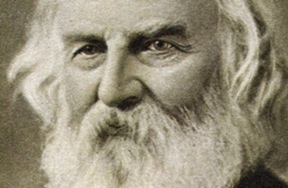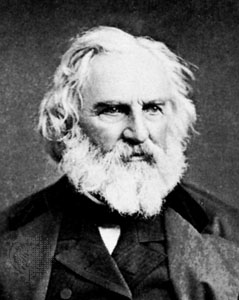“I Heard the Bells On Christmas Day…”—Repost
The following is a post that originally ran on December 13, 2011:
The Christmas carol “I Heard the Bells On Christmas Day” was originally a poem. Written by Henry Wadsworth Longfellow, it was arranged and set to music by John Calkin, who took it upon himself to edit out two stanzas which refer directly to the Civil War, thereby creating yet another easily forgettable holiday musical offering and entirely gutting the meaning of the original 1863 work.
Written by Henry Wadsworth Longfellow, it was arranged and set to music by John Calkin, who took it upon himself to edit out two stanzas which refer directly to the Civil War, thereby creating yet another easily forgettable holiday musical offering and entirely gutting the meaning of the original 1863 work.
By that time, 1863, even the New England abolitionists were appalled by the amount of blood and violence their cause had created. Although the Emancipation Proclamation was signed on January 1, eight hundred thousand slaves outside the Confederacy were not covered under its authority. The War seemed no closer to ending than when it had started, despite Union victories at Gettysburg and Vicksburg. The summer of Union optimism had turned into its winter of discontent.
Although Longfellow condemned slavery, he was not a fire-breathing abolitionist. He was, however, a close friend of Charles Sumner, who was. Sumner condemned “the peculiar institution” whenever and wherever he could, in harshest terms. Sumner delivered his infamous “Crime Against Kansas” speech on the floor of the Senate in May, 1856. This speech was particularly personal and inflammatory. Two days later, Preston Brooks, a Congressman from South Carolina and a cousin of one of the men insulted in the speech, approached Sumner and clubbed him over the head with his cane. Sumner was nearly killed.
Twelve years before, in 1842, Longfellow had published a thin book of poems for Sumner’s group, The New England Anti-Slavery Association. Longfellow himself claimed that the poems were “so mild that even a Slaveholder might read them without losing his appetite for breakfast,” but Sumner was satisfied with it, and the group reprinted it for further distribution.
Longfellow followed politics closely and, by 1860, realized that there must be some sort of resolution to the problems which beset the nation. His most famous poem, “Paul Revere’s Ride,” was written in time for a Christmas publication in The Atlantic Monthly. He hoped it would be a call for a new Revolution, although he, like so many Americans, never envisioned one so long and brutal.
Longfellow, like many in the country on both sides of the conflict, endured a significant amount of heartbreak during the war. The fall of Fort Sumter, the secession of the southern states, including Virginia, and Great Britain’s declaration of neutrality were just some of the incidents that brought grief to the poet.
The most personal tragedy was the death of his wife, Fanny, in 1861. Her clothing caught fire (a frequent occurrence at the time, unfortunately) as she lit the household candles, and she was badly burned. She died the next day, sending the writer into a prolonged period of grief.
Two years later, their seventeen-year old son, Charles Appleton Longfellow, ran away and joined the Union Army. Initially, the distraught father did not know where to find his son. The young man had gone to Washington, D.C. to seek a friend, Captain W. H. McCartney, commander of the 1st Massachusetts Artillery. Not wanting to enlist the son of a family friend, McCartney wired Longfellow for permission for “Charley” to enlist. Patriotically, he gave it.
This was not the harebrained scheme of a teenager to get away from home and his father’s preoccupation with the death of his mother. Charley wrote, “I have tried hard to resist the temptation of going without your leave, but I cannot any longer. I feel it to be my first duty to do what I can for my country and I would willingly lay down my life for it if it would be of any good.”
The young man was soon promoted to Lieutenant, and his first combat experience came at Chancellorsville. In June, Charley contracted typhoid and malaria, and was sent home to recover. He rejoined his unit on August 15, 1863.
On November 27, as part of the Mine Run Campaign in New Hope Church, Virginia, he was severely wounded by a bullet that entered his left shoulder, traveled across his back, nicked his spine, and exited the right shoulder. He was carried by ambulance to a field hospital on the Rapidan River, and then sent to a hospital in Washington. His recovery was not at all certain.
Longfellow learned of his son’s injury on December 1, 1863, and left immediately, along with his younger son Ernest, to recover Charley. All during his journey to the capital, the father was not certain if he would be bringing back a wounded son, or a dead one.
 In the midst of his sorrows—the War, a dead wife, a young family to raise alone, and a son who hovered near death—Longfellow thought of all the other households in the Union whose holidays were marred, some forever, by the events of the last three years. He did what writers do: he wrote. The resulting poem was the one we know as “I Heard the Bells On Christmas Day.” The poem was not intended to join the pantheon of sugary sweet Christmas carols already in place.
In the midst of his sorrows—the War, a dead wife, a young family to raise alone, and a son who hovered near death—Longfellow thought of all the other households in the Union whose holidays were marred, some forever, by the events of the last three years. He did what writers do: he wrote. The resulting poem was the one we know as “I Heard the Bells On Christmas Day.” The poem was not intended to join the pantheon of sugary sweet Christmas carols already in place.
There are two stanzas of the poem that never made it to the song we know today. They describe the effect of the War, and the sadness of the inhumanity it had caused, so antithetical to the spirit of Christmas. Below is the entire poem:
“Christmas Bells”
I heard the bells on Christmas Day
Their old, familiar carols play
And wild and sweet
The words repeat
Of peace on Earth, goodwill to men!And thought how, as the day had come,
The belfries of all Christendom
Had rolled along
The unbroken song
Of peace on Earth, goodwill to men!Till, ringing, singing on its way,
The world revolved from night to day,
A voice, a chime,
A chant sublime
Of peace on Earth, goodwill to men!Then from each black, accursed mouth
The cannon thundered from the South,
And with the sound
The carols drownedOf peace on Earth, goodwill to men!
It was as if an earthquake rent
The hearthstones of a continent,
And made forlorn
The households born
Of peace on Earth, goodwill to men!And in despair I bowed my head;
“There is no peace on Earth, “ I said:
“For Hate is strong,
And mocks the song
Of peace on Earth, goodwill to men!”Then pealed the bells more loud and deep:
“God is not dead; nor doth He sleep!
The Wrong shall fail,
The Right prevail,
With peace on Earth, goodwill to men!
Charley survived, and by December 8, he was back in Cambridge to recover at home. He lived, but the wound was considered too severe to allow Lieutenant Longfellow to return to his unit. He was mustered out on February 15, 1864.
* * *
If you have already heard this story and wonder why repeat an old, sentimental chestnut, let me remind you. If we do not tell the stories of our past, whether it is a past just gone by, or one bound up in myth and legend, we will lose it, and so will future generations. There is no better gift to give than that of a memory.
And if it is new to you, enjoy!
Recommended Reading:
God Rest Ye Merry, Soldiers by James McIvor
I believe another son, Charles A. Longfellow, joined the 1st Mass Cav as noted in the letter cited below – the source is Robert and Nancy Frost’s, Picket Pins and Sabers Letter of May 17, 63, p 46 …We have another Lieut a stripling sent to us by your patriotic government not from any merits of his own but he [Charles A Longfellow] happened to be the son of the poet Longfellow…I see by the paper…he got his promotion through his well-known horsemanship the writer never saw him or he is a mean low-lived liar for I will take my oath he is as poor if not the poorest rider in the regiment…
Charles, age 19, served mostly as the regimental adjutant until he was severely wounded in November 1863.
Ah well–the War included everyone, and citizen soldiers come in all sizes and levels of experience. I would hate to think what someone would say about most of us now.
Well said Meg